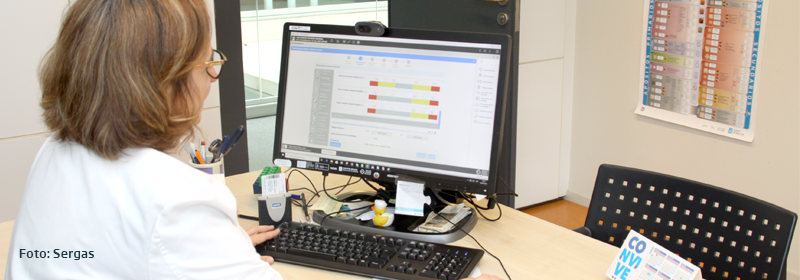- TELEA, the tele-assistance and proactive care platform developed by the company for the Galician Health Service (SERGAS), has made it possible to follow the progress of nearly 3,600 Galicians who are isolated in their homes and nearly 450 elderly people in their retirement homes after testing positive for coronavirus
- It quickly records possible worsening through alarms that reach the screens of the primary care and hospital team and notifies the professional responsible for the follow-up when the patient forgets to measure their temperature or oxygen saturation at the scheduled time
- SERGAS and Minsait were able to adapt TELEA, which was used for chronic conditions monitoring before the pandemic, to the new protocols against the virus in a record time of less than two days

TELEA, the tele-assistance and proactive care platform developed by Minsait for the Galician Health Service (SERGAS), has enabled the real-time monitoring of nearly 4,000 isolated COVID-19 patients during the pandemic, thus contributing to the immediate detection of worsening conditions and reducing the saturation of hospitals and health centers in the Galician Autonomous Community.
Since its implementation on March 11, more than 3,600 Galician people in their homes and about 450 residents in retirement homes have adhered to the two protocols designed by the Government of Galicia with the support of Minsait to record the evolution of patients and immediately send the guidelines for care to be followed or indicate the transfer to their hospital if the situation so requires.
The only requirement is that patients have a mobile device or a computer connected to the Internet to record their information three times a day. When logging in to the platform, which requires a username, password and PIN (the latter if using a cell phone) to guarantee full security, the patient has to enter their temperature and oxygen saturation data, in addition to answering a short survey on issues related to coughing, shortness of breath or sputum.
Worsening is immediately detected through alarms recorded by the primary care or hospital teams that are responsible for following up on patients who have tested positive or have been discharged and require regular monitoring due to their characteristics. All the information is also integrated into the patient's Process-oriented Electronic Health Record (HCEPRO).
These warning messages are sent when the temperature is above 37.5 degrees and saturation drops to 92%, and they change color (red or amber) depending on the severity of the symptoms, thus giving doctors a clear picture of the situation of patients under their care. In this way, it is possible to speed up decision-making, prioritize attention and provide greater safety to patients.
Another important benefit of TELEA is that warnings can be sent to doctors if the patient has forgotten to measure their temperature or oxygen saturation.
Response in record time
Prior to the pandemic, TELEA was already being used in Galician health centers and hospitals as part of a tele-assisted and proactive care model. In total, it monitored around 2,000 patients in their homes suffering from different pathologies such as heart disease, diabetes or COPD, facilitating early detection of possible health deterioration and dispensing with the need to travel.
After the outbreak of COVID-19, Minsait, following the indications of SERGAS, adapted TELEA to the new protocols required by the pandemic in a record time of less than two days. This was possible thanks to the capabilities of Onesait Platform, Minsait's open platform with IoT and Big Data capabilities that enables interoperability between different devices and systems, and which is integrated into TELEA.
This made it possible to cope with the increase of patients who needed to be treated, amounting to more than 7,000 people. Similarly, the tele-assistance platform was made available to more than 17,000 users (doctors and nurses) at the primary and specialized care levels, compared to the 6,900 who had access to the system before the pandemic.
Minsait is currently working on extending TELEA to new areas, such as care for the elderly and dependents, and its implementation in therapeutic diet monitoring will also be studied.
About Minsait
Minsait, an Indra company (www.minsait.com), is a leading firm in Digital Transformation Consultancy and Information Technologies in Spain and Latin America. Minsait possesses a high degree of specialization and knowledge of the sector, which it backs up with its high capability to integrate the core world with the digital world, its leadership in innovation and digital transformation, and its flexibility. Thus, it focuses its offering on high-impact value propositions, based on end-to-end solutions, with a remarkable degree of segmentation, which enables it to achieve tangible impacts for its customers in each industry with a transformational focus. Its capabilities and leadership are demonstrated in its product range, under the brand Onesait, and its across-the-board range of services.
About Indra
Indra (www.indracompany.com) is one of the leading global technology and consulting companies and the technological partner for core business operations of its customers world-wide. It is a world-leader in providing proprietary solutions in specific segments in Transport and Defence markets, and a leading firm in Digital Transformation Consultancy and Information Technologies in Spain and Latin America through its affiliate Minsait. Its business model is based on a comprehensive range of proprietary products, with a high-value focus and with a high innovation component. In the 2019 financial year, Indra achieved revenue of €3.204 billion, with more than 49,000 employees, a local presence in 46 countries and business operations in over 140 countries.